Darcia Helle's Blog, page 33
October 21, 2021
A Must Read for Mystery Fans — MERCY CREEK: A Jo Wyatt Mystery by M.E. Browning
 In an idyllic Colorado town, a young girl goes missing—and the trail leads into the heart and mind of a remorseless killer.
In an idyllic Colorado town, a young girl goes missing—and the trail leads into the heart and mind of a remorseless killer.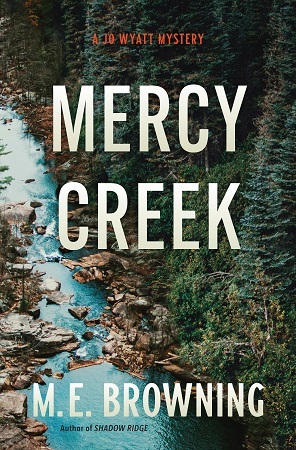 The late summer heat in Echo Valley, Colorado turns lush greenery into a tinder dry landscape. When a young girl mysteriously disappears, long buried grudges rekindle. Of the two Flores girls, Marisa was the one people pegged for trouble. Her younger sister, Lena, was the quiet daughter, dutiful and diligent—right until the moment she vanished.
The late summer heat in Echo Valley, Colorado turns lush greenery into a tinder dry landscape. When a young girl mysteriously disappears, long buried grudges rekindle. Of the two Flores girls, Marisa was the one people pegged for trouble. Her younger sister, Lena, was the quiet daughter, dutiful and diligent—right until the moment she vanished.
Detective Jo Wyatt is convinced the eleven-year-old girl didn’t run away and that a more sinister reason lurks behind her disappearance. For Jo, the case is personal, reaching far back into her past. But as she mines Lena’s fractured family life, she unearths a cache of secrets and half-lies that paints a darker picture.
As the evidence mounts, so do the suspects, and when a witness steps forward with a shocking new revelation, Jo is forced to confront her doubts, and her worst fears. Now, it’s just a matter of time before the truth is revealed—or the killer makes another deadly move.
Book Details:Read an excerpt:Chapter OneGenre: Mystery
Published by: Crooked Lane Books
Publication Date: October 12th 2021
Number of Pages: 288
ISBN: 1643857622 (ISBN13: 9781643857626)
Series: A Jo Wyatt Mystery, Book 2 || Each mystery in the A Jo Wyatt Mystery series is a stand alone novel.
Purchase Links: Penguin Random House | Amazon | Barnes & Noble | Goodreads
Everyone had a story from that night. Some saw a man, others saw a girl, still others saw nothing at all but didn’t want to squander the opportunity to be part of something larger than themselves. To varying degrees, they were all wrong. Only two people knew the full truth.
That Saturday, visitors to the county fair clustered in the dappled shade cast by carnival rides and rested on hay bales scattered like afterthoughts between games of chance and food booths, the soles of their shoes sticky with ice cream drips and spilled sodas.
Detective Jo Wyatt stepped into the shadow of the Hall of Mirrors to watch the crowd. She grabbed the collar of her uniform and pumped it a few times in a futile attempt to push cooler air between her ballistic vest and sweat-sodden T-shirt.
The Echo Valley Fair marked the end of summer, but even now, as the relentless Colorado sun dipped, heat rose in waves around bare ankles and stroller wheels as families retreated toward the parking lots. An older crowd began to creep in, prowling the midway. The beer garden overflowed.
Within minutes the sun dropped behind the valley walls and the fairground lights flickered to life, their wan orange glow a beacon to moths confused by the strobing brightness of rides and games. Calliope music and the midway’s technopop collided in a crazed mishmash of notes so loud they echoed in Jo’s chest. She raised the volume of her radio.
The day shift officers had clocked out having handled nothing more pressing than a man locked out of his car and an allegation of unfair judging flung by the second-place winner of the bake-off.
Jo gauged the teeming crowd of unfamiliar faces. Tonight would be different.
#
Carnival music was creepy, Lena decided. Each ride had its own weird tune and it all seemed to crash against her with equal force, following her no matter where she went.
The guys in the booths were louder than they had been earlier, more aggressive, calling out, trying to get her to part with her tickets. Some of the guys roamed, jumping out at people, flicking cards and making jokes she didn’t understand while smiling at her older sister.
Marisa tossed her hair. Smiled back. Sometimes they let her play for free.
“Let’s go back to the livestock pavilion,” Lena said.
“Quit being such a baby.” Marisa glanced over her shoulder at the guy running the shooting gallery booth and tossed her hair. Again.
Lena rolled her eyes and wondered how long it would be before her sister ditched her.
“Hold up a sec.” Marisa tugged at the hem of her skintight skirt and flopped down on a hay bale.
She’d been wearing pants when they’d left the house. The big purse she always carried probably hid an entire wardrobe Momma knew nothing about. Lena wondered if the missing key to grandma’s car was tucked in there too.
Marisa unzipped one of her boots and pulled up her thin sock.
Lena pointed. “What happened to the bottom of your boot?”
Her sister ran her finger along the arch. “I painted it red.”
“Why?”
“It makes them more valuable.”
“Since when does coloring the bottom of your shoes make them more valuable?”
Marisa’s eyes lit up in a way that happened whenever she spoke about clothes or how she was going to hit it big in Hollywood someday. “In Paris there’s this guy who designs shoes and all of them have red soles. He’s the only one allowed to do that. It’s his thing.”
“But he didn’t make those boots.”
“All the famous women wear his shoes.” She waved to someone in the crowd.
“You’re not famous and you bought them at Payless.”
“What do you know about fashion?”
“I know enough not to paint the bottom of my boots to make them look like someone else made them.”
Marisa shoved her foot into her boot and yanked the zipper closed. “You bought your boots from the co-op.” She handed Lena her cell phone.
“You should have bought yours there, too.” Lena dutifully pointed the lens at her sister.
“Take a couple this time.” Marisa leaned back on her hands and arched her back, her hair nearly brushing the hay bale, and the expression on her face pouty like the girls in the magazines she was always looking at.
Lena snapped several photos and held out the phone. “All those high heels are good for is punching holes in the ground.”
“Oh, Lena.” Marisa’s voice dropped as if she was sharing a secret. “If you ever looked up from your animals long enough, you’d see there’s so much more to the world.” Her thumbs rapidly tapped the tiny keyboard of her phone.
In the center of the midway, a carnival guy held a long-handled mallet and called out to people as they passed by. He was older—somewhere in his twenties—and wore a tank top. Green and blue tattoos covered his arms and his biceps bulged as he pointed the oversized hammer at the tower behind him. It looked like a giant thermometer with numbers running along one edge, and High Striker spelled out on the other.
“Come on, men. There’s no easier way to impress the ladies.” He grabbed the mallet and tapped the plate. “You just have to find the proper motivation if you want to get it up…” He pointed with his chin to the top of the game and paused dramatically. “There.” He craned his neck and leered at Marisa. Lena wondered if he was looking up her sister’s skirt. “What happens later is up to you.”
Never breaking eye contact, he took a mighty swing. The puck raced up the tower, setting off a rainbow of lights and whistles before it smashed into the bell at the top. He winked in their direction. “Score.”
Twenty minutes later, Marisa was gone.
#
Lena gave up looking for her sister and returned to the livestock pavilion. Marisa could keep her music and crowds and stupid friends.
Only a few people still wandered around the dimly lit livestock pavilion. The fireworks would start soon and most people headed for the excitement outside, a world away from the comforting sound of animals snuffling and pawing at their bedding.
Marisa was probably hanging out near the river with her friends, drinking beer. Maybe smoking a cigarette or even a joint. Doing things she didn’t think her baby sister knew about.
Lena walked through an aisle stacked with poultry and rabbit cages. The pens holding goats, swine, and sheep took up the middle. At the back of the pavilion stretched a long row of three-sided cattle stalls. The smells of straw, grain, and animals replaced the gross smell of deep-fried candy bars and churros that had clogged her throat on the midway.
Near the end of the row, Lena stopped.
“Hey there, Bluebell.” Technically, he was number twenty-four, like his ear tag said. Her father didn’t believe in naming livestock, but to her, he’d always be Bluebell—even after she sold him at the auction to be slaughtered. Just because that was his fate didn’t mean he shouldn’t have a name to be remembered by. She remembered them all.
She patted his hip and slid her hand along his spine so he wouldn’t shy as she moved into the stall. She double-checked the halter, pausing to scratch his forehead. A piece of straw swirled in his water bucket and she fished it out. The cold water cooled her hot skin.
“You did good today. Sorry I won’t be spending the night with you, but Papa got called out to Dawson’s ranch to stitch up some mare.”
He swished his tail and it struck the rail with a metallic ring.
“Don’t get yourself all riled. I’ll be back tomorrow before you know it.”
If she hadn’t been showing Bluebell this afternoon, she’d have gone with her father. Her sutures had really improved this summer and were almost as neat as his. No one would guess they’d been made by an eleven-year-old. If nothing else, she could have helped keep the horse calm.
Instead, she’d go home with Marisa and spend the night at Momma’s. She wondered if Marisa would show up before the 4-H leader called lights out in the pavilion or if Lena would have to walk to her mom’s house by herself in the dark.
She reached down and jiggled the feed pan to smooth out the grain that Bluebell had pushed to the edges.
“That’s some cow.”
The male voice startled them both and Bluebell stomped his rear hoof. Lena peered over the Hereford’s withers. At first all she saw were the tattoos. An ugly monster head with a gaping mouth and snake tongue seem to snap at her. It was the carny from the High Striker standing at the edge of the stall.
“It’s a steer,” she stuttered. “And my sister isn’t here.”
“Not your sister I wanted to talk to.” He swayed a bit as he moved into the stall, like when her mother drank too much wine and tried to hide it.
Lena ducked under Bluebell’s throat and came up on the other side. She looked around the pavilion, now empty of people.
“Suspect they’re all out waiting on the fireworks,” he said.
The first boom echoed through the space. Several sheep bleated their disapproval and Bluebell jerked against his halter.
“Shhhh, now.” Lena reached her hand down and scratched his chest. “All that racket’s just some stupid fireworks.”
“Nothing to worry about,” the man added. He had the same look in his eyes that Papa’s border collie got right before he cut off the escape route of a runaway cow.
A bigger boom thundered through the pavilion. Halter clips clanged against the rails as uneasy cattle shuffled in their stalls. Her own legs shook as she sidled toward Bluebell’s rear.
He matched her steps. “What’s a little thing like you doing in here all by yourself?”
“My father will be back any minute.” Her voice shook.
He smiled, baring his teeth. “I’ll be sure to introduce myself when he arrives.”
A series of explosions, sharp as gunfire, erupted outside. Somewhere a cow lowed. Several more joined in, their voices pitiful with fear.
“You’re upsetting my steer. You need to leave.”
“Oh, your cow’s just fine. I think it’s you that’s scared.”
He spoke with the same low voice that Lena used with injured animals. The one she used right before she did something she knew would hurt but had to be done.
“You’re a pretty little thing,” he crooned. “Nice and quiet.”
Her tongue stuck to the roof of her mouth. She stood frozen. A warm trickle started down her leg, and the wet spot expanded on her jeans.
He edged closer. “I like them quiet.”
#
Jo ran.
The suspect veered off the sidewalk and slid down the hillside toward the creek.
She plunged off the side of the embankment, sliding through dirt and duff, closing the distance. She keyed her shoulder mic. “Entering the creek, heading west toward the Animas. I need someone on the River Trail.”
Narrow-leaf cottonwood and willows shimmered silver in the moonlight and wove a thicket of branches along the water, herding the suspect toward the cobbled stream bed.
Jo splashed into the ankle-deep water. Close enough now to almost touch.
Her lungs burned. With a final burst of speed, she lunged. Shoved his shoulder while he was mid-stride.
The man sprawled into the creek. Rolled onto his feet with a bellow. A knife in his hand.
Without thinking, she’d drawn her gun. “Drop it!”
Flashlight beams sliced the foliage. Snapping branches and crashing footsteps marked the other officers’ progress as they neared. Estes shouted Jo’s name. Her eyes never left the man standing just feet away.
“Over here!” She focused on the man’s shoulder, watching for the twitch that would telegraph his intentions. “You need to drop the knife. Now.” Her voice rose above the burble of the stream. “Or things are going to get a whole lot worse for you tonight.”
She shifted her weight to her front leg and carefully shuffled her rear foot until she found firmer footing and settled into a more stable shooting stance. “Drop the knife.” She aimed center mass. Drew a deep breath, willed her heart to slow.
The knife splashed into the creek near the bank.
“On your right.” Estes broke through the brush beside her.
“Get down on your knees,” Jo ordered. “Hands behind your head.”
“It’s my friend’s truck,” the man said.
Jo holstered her gun and moved forward while Estes covered her. She gripped his fingers and bowed the suspect backward, keeping him off balance while she searched him for weapons, then cuffed him.
“Not according to the owner.” She double-locked the cuffs while Estes radioed dispatch they had one in custody.
An explosion above the treetops made Jo flinch. Fireworks slashed the darkness and burst into balls of purple and green and dazzling white that sparkled briefly, then disappeared.
***
Excerpt from Mercy Creek by M.E. Browning. Copyright 2021 by M.E. Browning. Reproduced with permission from M.E. Browning. All rights reserved.
My Thoughts
Mercy Creek takes us to Echo Valley, Colorado, where the town is small, the landscape is vast, and the relationships are complicated.
I really enjoyed Shadow Ridge, the first Jo Wyatt Mystery, but I loved Mercy Creek. This is a character-driven mystery full of complexities and insight.
Detective Jo Wyatt is a badass female lead, with just the right mix of flaws and strengths to make her realistic and likable. All the characters are well developed, so I cared about the outcome.
Mercy Creek works as a stand-alone if you want to jump into the series here with book 2.

M.E. Browning writes the Colorado Book Award-winning Jo Wyatt Mysteries and the Agatha-nominated and award-winning Mer Cavallo Mysteries (as Micki Browning). Micki also writes short stories and nonfiction. Her work has appeared in dive magazines, anthologies, mystery magazines, and textbooks. An FBI National Academy graduate, Micki worked in municipal law enforcement for more than two decades and retired as a captain before turning to a life of crime… fiction.
MEBrowning.com
Goodreads
BookBub
Instagram – @mickibrowning
Twitter – @MickiBrowning
Facebook – @MickiBrowningAuthor
Tour Participants:
Visit these other great hosts on this tour for more great reviews, interviews, guest posts, and giveaways!
ENTER TO WIN:This is a rafflecopter giveaway hosted by Partners in Crime Virtual Book Tours for M.E. Browning. There will be TWO winners. ONE winner will receive (1) Amazon.com Gift Card and ONE winner will receive one (1) physical copy of Mercy Creek by M.E. Browning (U.S. addresses only). The giveaway runs October 11 through November 7, 2021. Void where prohibited.
Get More Great Reads at Partners In Crime Virtual Book Tours
The post A Must Read for Mystery Fans — MERCY CREEK: A Jo Wyatt Mystery by M.E. Browning appeared first on Quiet Fury Books.
October 20, 2021
Book Review: ROCK PAPER SCISSORS by Alice Feeney
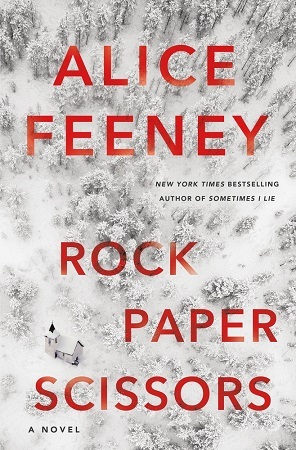
Think you know the person you married? Think again…
Things have been wrong with Mr and Mrs Wright for a long time. When Adam and Amelia win a weekend away to Scotland, it might be just what their marriage needs. Self-confessed workaholic and screenwriter Adam Wright has lived with face blindness his whole life. He can’t recognize friends or family, or even his own wife.
Every anniversary the couple exchange traditional gifts–paper, cotton, pottery, tin–and each year Adam’s wife writes him a letter that she never lets him read. Until now. They both know this weekend will make or break their marriage, but they didn’t randomly win this trip. One of them is lying, and someone doesn’t want them to live happily ever after.
Ten years of marriage. Ten years of secrets. And an anniversary they will never forget.
Rock Paper Scissors is the latest exciting domestic thriller from the queen of the killer twist, New York Times bestselling author Alice Feeney.
Published: September 2021
My ThoughtsI love when I’m reading, going along like, Yeah, I’ve got this, then suddenly a figurative hand reaches out from the pages and slaps me, hard, saying, Nope, you didn’t even come close to getting it.
That was Rock Paper Scissors.
The story is a slow burn. You know something is off. You know this couple is keeping secrets from each other. You might think you know what’s coming, but watch out for that figurative slap that turns this story upside down.
I didn’t like the main characters, which is usually a problem for me. But here, though unlikable, I found them wholly fascinating.
I thought the pacing lagged a little in the middle. Then, just at the point where I was getting restless, everything changed.
The unsettling atmosphere and the isolated setting gives this story exactly the right creepiness factor.
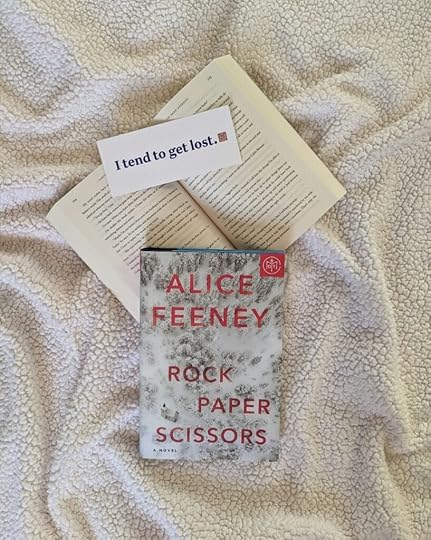
The post Book Review: ROCK PAPER SCISSORS by Alice Feeney appeared first on Quiet Fury Books.
New Historical Fiction — SISTERS OF THE GREAT WAR by Suzanne Feldman

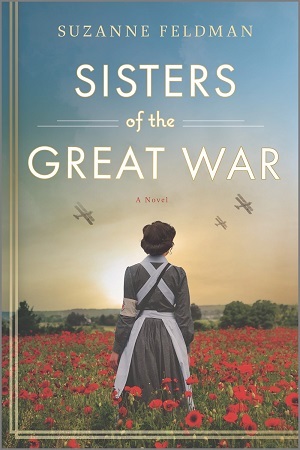 Two sisters. The Great War looming. A chance to shape their future.
Two sisters. The Great War looming. A chance to shape their future.
Sisters Ruth and Elise Duncan could never have anticipated volunteering for the war effort. But in 1914, the two women decide to make the harrowing journey from Baltimore to Ypres, Belgium in order to escape the suffocating restrictions placed on them by their father and carve a path for their own future.
Smart and practical Ruth is training as a nurse but dreams of becoming a doctor. In a time when women are restricted to assisting men in the field, she knows it will take great determination to prove herself, and sets out to find the one person who always believed in her: a handsome army doctor from England. For quiet Elise, joining the all female Ambulance Corps means a chance to explore her identity, and come to terms with the growing attraction she feels towards women. Especially the charming young ambulance driver who has captured her heart.
In the twilight of the Old World and the dawn of the new, both young women come of age in the face bombs, bullets and the deadly futility of trench warfare. Together they must challenge the rules society has placed on them in order to save lives: both the soldiers and the people they love.
SISTERS OF THE GREAT WAR
Author: Suzanne Feldman
ISBN: 9780778311225
Publication Date: October 26, 2021
Publisher: MIRA Books
Buy Links:
BookShop.org
Harlequin
Barnes & Noble
Amazon
Books-A-Million
Powell’s
1
Baltimore, Maryland
August 1914
Ruth Duncan fanned herself with the newspaper in the summer heat as Grandpa Gerald put up a British flag outside the house. If he’d had a uniform—of any kind—he would have worn it. People on the sidewalk paused and pointed, but Grandpa, still a proper English gent even after almost twenty years in the U.S., smoothed his white beard and straightened his waistcoat, ignoring the onlookers.
“That’s done,” he said.
Ruth’s own interest in the war was limited to what she read in the paper from across the dining table. Grandpa would snap the paper open before he ate breakfast. She could see the headlines and the back side of the last page, but not much more. Grandpa would grunt his appreciation of whatever was in-side, snort at what displeased him, and sometimes laugh. On the 12thof August, the headline in the Baltimore Sun read; France And Great Britain Declare War On Austria-Hungary, and Grandpa wasn’t laughing.
Cook brought in the morning mail and put it on the table next to Grandpa. She was a round, grey-haired woman who left a puff of flour behind her wherever she went.
“Letter from England, sir,” Cook said, leaving the envelope and a dusting of flour on the dark mahogany. She smiled at Ruth and left for the kitchen.
Grandpa tore the letter open.
Ruth waited while he read. It was from Richard and Diane Doweling, his friends in London who still wrote to him after all these years. They’d sent their son, John, to Harvard in Massachusetts for his medical degree. Ruth had never met John Doweling, but she was jealous of him, his opportunities, his apparent successes. The Dowelings sent letters whenever John won some award or other. No doubt this was more of the same. Ruth drummed her fingers on the table and eyed the dining room clock. In ten minutes, she would need to catch the trolley that would take her up to the Loyola College of Nursing, where she would be taught more of the things she had already learned from her father. The nuns at Loyola were dedicated nurses, and they knew what they were doing. Some were out-standing teachers, but others were simply mired in the medicine of the last century. Ruth was frustrated and bored, but Father paid her tuition, and what Father wanted, Father got.
Ruth tugged at her school uniform—a white apron over a long white dress, which would never see a spot of blood. “What do they say, Grandpa?”
He was frowning. “John is enlisting. They’ve rushed his graduation at Harvard so he can go home and join the Royal Army Medical Corps.”
“How can they rush graduation?” Ruth asked. “That seems silly. What if he misses a class in, say, diseases of the liver?”
Grandpa folded the letter and looked up. “I don’t think he’ll be treating diseases of the liver on the battlefield. Anyway, he’s coming to Baltimore before he ships out.”
“Here?” said Ruth in surprise. “But why?”
“For one thing,” said Grandpa, “I haven’t seen him since he was three years old. For another, you two have a common interest.”
“You mean medicine?” Ruth asked. “Oh, Grandpa. What could I possibly talk about with him? I’m not even a nurse yet, and he’s—he’s a doctor.” She spread her hands. “Should we discuss how to wrap a bandage?”
“As long as you discuss something.” He pushed the letter across the table to her and got up. “You’ll be showing him around town.”
“Me?” said Ruth. “Why me?”
“Because your sister—” Grandpa nodded at Elise, just clumping down the stairs in her nightgown and bathrobe “—has dirty fingernails.” He started up the stairs. “Good morning, my dear,” he said. “Do you know what time it is?” “Uh huh,” Elise mumbled as she slumped into her seat at the table.
As Grandpa continued up the stairs Ruth called after him. “But when is he coming?”
“His train arrives Saturday at noon,” Grandpa shouted back. “Find something nice to wear. You too, Elise.”
Elise rubbed her eyes. “What’s going on?”
Ruth pushed the letter at her and got up to go. “Read it,” she said. “You’ll see.”
Ruth made her way down Thirty-Third Street with her heavy bookbag slung over one shoulder, heading for the trolley stop, four blocks away, on Charles. Summer classes were almost over, and as usual, the August air in Baltimore was impenetrably hot and almost unbreathable. It irritated Ruth to think that she would arrive at Loyola sweaty under her arms, her hair frizzed around her nurse’s cap from the humidity. The nuns liked neatness, modest decorum. Not perspiring young women who wished they were somewhere else.
Elise, Ruth thought, as she waited for a break in the noisy traffic on Charles Street, could’ve driven her in the motor-car, but no, she’d slept late. Her younger sister could do pretty much anything, it seemed, except behave like a girl. Elise, who had been able to take apart Grandpa’s pocket watch and put it back together when she was six years old, was a use-ful mystery to both Father and Grandpa. She could fix the car—cheaper than the expensive mechanics. , For some rea-son, Elise wasn’t obliged to submit to the same expectations as Ruth—she could keep her nails short and dirty. Ruth wondered, as she had since she was a girl, if it was her younger sister’s looks. She was a mirror image of their mother, who had died in childbirth with Elise. Did that make her special in Father’s eyes?
An iceman drove a sweating horse past her. The horse raised its tail, grunted, and dropped a pile of manure, rank in the heat, right in front of her, as though to auger the rest of her day. The iceman twisted in the cart to tip his hat. “Sorry Sister!”
Ruth let her breath out through her teeth. Maybe the truth of the matter was that she was the ‘sorry sister.’ It was at this exact corner that her dreams of becoming a doctor, to follow in her father’s footsteps, had been shot down. When she was ten, and the governess said she’d done well on her writing and math, she was allowed to start going along on Father’s house calls and help in his office downstairs. Father had let her do simple things at first; mix plaster while he positioned a broken ankle, give medicine to children with the grippe, but she watched everything he did and listened carefully. By the time she was twelve, she could give him a diagnosis, and she remembered her first one vividly, identifying a man’s abdominal pain as appendicitis.
“You did a good job,” Father had said to her, as he’d reined old Bess around this very corner. “You’ll make an excellent nurse one day.”
Ruth remembered laughing because she’d thought he was joking. Her father’s praise was like gold. “A nurse?” she’d said. “One day I’ll be a doctor, just like you!”
“Yes, a nurse,” he’d said firmly, without a hint of a smile. It was the tone he used for patients who wouldn’t take their medicine.
“But I want to be a doctor.”
“I’m sorry,” he said. He hadn’t sounded sorry at all. “Girls don’t become doctors. They become nurses and wives. Tomorrow, if there’s time, we’ll visit a nursing college. When you’re eighteen, that’s where you’ll go.”
“But—”
He’d shaken his head sharply, cutting her off. “It isn’t done, and I don’t want to hear another word about it.”
A decade later, Ruth could still feel the shock in her heart. It had never occurred to her that she couldn’t be a doctor because she was a girl. And now, John Doweling was coming to town to cement her future as a doctor’s wife. That was what everyone had in mind. She knew it. Maybe John didn’t know yet, but he was the only one.
Ruth frowned and lifted her skirts with one hand, balancing the bookbag with the other, and stepped around the manure as the trolley came clanging up Charles.
Excerpted from Sisters of the Great War by Suzanne Feldman, Copyright © 2021 by Suzanne Feldman. Published by arrangement with Harlequin Books S.A
About the AuthorSuzanne Feldman, a recipient of the Missouri Review Editors’ Prize and a finalist for the Bakeless Prize in fiction, holds an MA in fiction from Johns Hopkins University and a BFA in art from the Maryland Institute College of Art. Hershort fiction has appeared in Narrative, The Missouri Review, Gargoyle, and other literary journals. She lives in Frederick, Maryland.
Social Links:
Author Website
Twitter: @suzanne21702
Facebook: @SuzanneFeldman
Instagram: @suzannefeldmanauthor
Goodreads
The post New Historical Fiction — SISTERS OF THE GREAT WAR by Suzanne Feldman appeared first on Quiet Fury Books.
October 19, 2021
New Release Spotlight — THE ENCANTO: LA Fog Part 1 by Arthur Swan
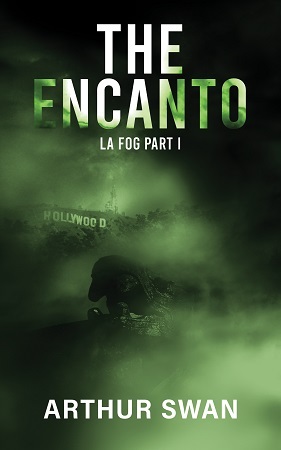 An ancient Mayan artifact, smuggled into Los Angeles, unexpectedly alters three lives in bizarre ways.
An ancient Mayan artifact, smuggled into Los Angeles, unexpectedly alters three lives in bizarre ways.
Gray, an aspiring artist struggling to provide for his family, Claire, his insomniac wife, and Ashley York, a wealthy socialite striving to make it as a real actress, find their paths crashing together, their dreams and their very identities threatened.
Meanwhile, Saul Parker, a detective and hobbyist magician who is self-conscious about his weight, strives to solve a strange case that seems impossible to comprehend.
Only Wayob, a mysterious chameleon-like killer, has a grasp on the dangerous power that has consumed his life and now infiltrates the others.
The Encanto, Book 1 of the LA Fog series, is an intricately woven, character-based mystery about how the choices we make inform our identity.
Amazon | Barnes and Noble | Goodreads
Excerpta cloud be too much to ask? The afternoon sky had thinned out and surrendered to the relentless sun. Saul parked on Lincoln Boulevard near the mob of looky-loos pressing in around the barricades on the sidewalk. Behind the crime scene was a carwash with faded fin-toppers that might have looked stylish in the sixties.
He left the engine running for the AC. In front of him was a pink van advertising “Topless Maids $99” and then a squad car. Beside it, Hernandez was talking to the uniforms. She was five foot two and lithe. She only saw him as a partner, but Saul was hoping for more.
He couldn’t bear for her to see him heave his huge belly out. If she would just get in here with him, they could crank up the AC and talk like human beings. Forget all the politics and procedure of the LAPD.
He motioned her towards his car, but she looked away.
He flashed his lights.
Useless signal against the sunlight. He sighed. Grabbed his trench coat from the backseat. Climbed out of the car and put it on. It did little to hide his girth. If anything, the coat made him more conspicuous.
Instantly sweating, he tried to ignore the murmurs from the crowd, the mouths gaping open, all the phones pointing at him as plowed his big belly toward Hernandez.
She glanced at him from the corner of her eye but continued joking with the uniforms, as if unaware of his approach. Her skin was perfect. She would look twenty-five if not for the clump of gray hair always falling across her forehead.
“What’s the status?” he asked.
“Where you been, Barker?” She trotted out her Chicana accent, pronouncing the P in his last name like a B. She was pissed.
“Traffic’s a bitch,” he said.
She pointed inside his coat. “Is that the evidence you were looking for?”
He glanced down. A dollop of ketchup stained his shirt. He hadn’t noticed it escape his burger. He should have told her he was going to the Castle for lunch. She knew he belonged to the clubhouse for the Academy of Magical Arts, but she had no idea how much he loved going there. The ornate wood and crystal chandeliers. The deliberate lack of windows which made it feel like stepping out of LA and back in time to an alternate world where the air seemed to spark with possibility.
He’d only lied because Hernandez was working through lunch, and what if, like his ex, she hated magic?
He buttoned his coat over the stain. They needed to focus on the case. At least Saul did. Not that Lieutenant Levy had actually told him in so many words, but she’d called Hernandez with the assignment instead of Saul when he was the lead detective, or he was supposed to be. If Levy had demoted him, she should have at least told him, but Saul wasn’t surprised. She was passive-aggressive and still held a grudge against him for the Brown shooting. Although he’d been cleared of wrongdoing, the fallout had stalled her career.
Hernandez led him away from the uniforms to the black-and-white on the curb in front of Checks Cashed. In the backseat, a middle-aged man with a shaved head, stared at the crowd with a sour expression.
Hernandez turned toward Saul and combed back her shock of white. “Look. I don’t care if you take a long lunch, just let me know where you’re at, okay? We’re partners. We’re supposed to trust each other.”
Her eyes caught the sunlight like honey. Saul tried to memorize every detail. He could gaze into them for hours. “I went to the Castle. If you want to come next time—”
“Hollywood is too far for lunch.”
Was she suggesting somewhere else? A real sit-down meal instead of their usual takeout. Or maybe dinner? The Castle would be ideal for dinner.
Before he could ask, she slapped the roof of the squad car. “We’ve got the bastard dead to rights, and get this: he can’t move his legs.”
“He’s a paraplegic?”
“Exactly. His wheelchair’s in the trunk.”
Saul peered through the back window of the car. The man inside had a potbelly. His arms were cuffed behind his back. He looked up at Saul, his face blank and his eyes, shadowed by a massive brow, just dark hollows.
Saul shuddered.
About the Author Arthur Swan was raised in North Carolina and now resides in Los Angeles. He has contributed to films ranging from ‘A Beautiful Mind’ to ‘How to Train Your Dragon’.On weekdays, he rises before the sun and starts writing, followed by a swim at one of his favorite outdoor pools in LA, followed by a big breakfast, more writing, and then his day job.He volunteers for Young Storytellers, enjoys fishing and fireworks with his favorite niece and nephew, and on weekends he can be found hiking high climbs in early fog before the sun burns through as mist vanishes to blue sky, or otherwise, he’s probably trying to write.
Arthur Swan was raised in North Carolina and now resides in Los Angeles. He has contributed to films ranging from ‘A Beautiful Mind’ to ‘How to Train Your Dragon’.On weekdays, he rises before the sun and starts writing, followed by a swim at one of his favorite outdoor pools in LA, followed by a big breakfast, more writing, and then his day job.He volunteers for Young Storytellers, enjoys fishing and fireworks with his favorite niece and nephew, and on weekends he can be found hiking high climbs in early fog before the sun burns through as mist vanishes to blue sky, or otherwise, he’s probably trying to write.
SOCIAL LINKS:
Website
Facebook
Twitter: @ArthurSwanAuth
Instagram: @ArthurSwanAuth

The post New Release Spotlight — THE ENCANTO: LA Fog Part 1 by Arthur Swan appeared first on Quiet Fury Books.
October 18, 2021
New Release Spotlight — CYNTHIA STARTS A BAND by Olivia Swindler
 EVEN AMERICA’S SWEETHEART POP-SUPERSTAR HAS TROUBLE FINDING THEIR VOICE IN THE HEARTBREAKINGLY HONEST DEBUT NOVEL FROM OLIVIA SWINDLER
EVEN AMERICA’S SWEETHEART POP-SUPERSTAR HAS TROUBLE FINDING THEIR VOICE IN THE HEARTBREAKINGLY HONEST DEBUT NOVEL FROM OLIVIA SWINDLER
Eleanor Quinn lives a life most young girls dream of. She’s the lead singer of a wildly successful band, dating the most beautiful man in America, and in love with her life on tour. She pours her heart into every song she writes and genuinely enjoys connecting with fans. So, when she disappears after her fiance’s fairy-tale perfect proposal on stage, the world is shocked. Worse yet, he starts telling interviewers that Eleanor is crazy — possibly even a danger to herself and those around her. As the weeks go by, the world wants to know: Who is Eleanor Quinn really?
But Eleanor needs to find that out for herself.
Broken and filled with self-doubt after the proposal, Eleanor embarks on a journey to regain agency in her life. She needs to reconnect with the Ellie Quinn underneath pop sensation “Eleanor Quinn.” Determined to find herself again, she moves in with her cousin in Seattle, picks a new name, and enrolls in a local university’s writing class. But she starts to realize that running away and starting over isn’t as easy as it seems in movies. Crushed by self-doubt and subconscious fears, ghosts from her past refuse to leave her alone. She realizes the only way forward is to share her version of the past.
Olivia Swindler’s debut novel embraces the values of family, empowerment, and healing and draws on the #metoo movement. Reminiscent of Evvie Drake Starts Over (Linda Holmes) and Searching for Sylvie Lee (Jean Kwok), Cynthia Starts a Band tells the story of starting over, discovering who you are when the world isn’t looking, and summoning the courage to be honest with yourself and the world.
PURCHASE LINKS:
Amazon
Barnes and Noble
Cynthia
I had no idea what day of the week it was, but that was normal for me. Days of the week meant nothing to me when we were touring. My internal calendar instead went like this: today, the bus will take us there, and then tomorrow, we will get back on the bus and be there. It didn’t matter if it was Tuesday or Friday; all days had the same value.
On the other hand, this was the first time in a long time I hadn’t needed to incessantly check the clock on my phone. I wasn’t afraid of being late to a soundcheck. I didn’t feel that familiar pit in my stomach telling me that I had overslept and would be late for hair and makeup.
For the first time in years, my time was mine.
I opened my eyes and peered out the window. We were cruising along a major highway. I was sure that I had been on this road at some point in my life before. Before, this road had meant nothing, but now the same open road meant freedom.
I had told the ticket salesman that I wanted a ticket to get to Seattle—although I had no real idea of how to get there. I wasn’t even sure if I knew precisely where Seattle was. I had visited Seattle plenty of times, but it had been clouded by the tour haze. I knew it was a big city, which meant I would be able to slip into my new life there without standing out.
I hadn’t realized how far away Seattle was from Denver. They were both on the West Coast; somehow, I had figured it would only take a few hours to get from one to the other. They had always been so close together on our schedule.
In Portland, I changed buses. The stop made me surer than ever of my decision.
I had done it. I had gotten out.
It still didn’t feel real. I had dreamed about this moment for so long, without ever actually believing it would happen.
I hadn’t told anyone that I was leaving, but I was sure they knew by now.
After the incident, I had walked out of the arena and gone straight to the bus station. I hadn’t even bothered getting my things from my bus or the dressing room. It hadn’t occurred to me that I should have withdrawn some cash. I would get some money soon. If they wanted to find me, they would check my credit card statements. I had seen enough action movies to know this was usually the first thing checked when looking for a missing person: a credit card trail.
I guessed I also needed to change my name. Or at least go by a different one? I really hadn’t thought this part of the plan through very well.
When we were first starting out, someone had asked me if I planned on using a stage name. “Everyone does it,” I was told. But I was sixteen at the time and thought there was something cool about seeing my name up in lights. That was me! My real name. At no point had I imagined that I would need a pseudonym.
If I had gone by a stage name, this might have been easier. I could have just reverted to who I had been before the world cared about who I had become.
I needed the opposite of a stage name.
I reached for my phone—at least I had had the presence of mind to grab that—and had another realization: I would probably have to get a new phone. After checking the runaway’s credit card activity, people always tracked their phones. There was something techy that could be done by pinging off cell towers. I wasn’t sure what that meant, but I had seen it in enough movies to be wary of calling anyone.
I looked down at my lit-up phone screen.
Of course, he had called. It would have been stupid to expect otherwise.
I didn’t have to call him back. A weight lifted from my shoulders, and I took a deep, shuddering breath. I was free! I never had to call him back ever again.
James had called me twenty-three times, to be exact. While I had expected that, I still felt a slight pang of remorse. I had known James since high school. I was just a long-legged teenager when he became our manager. We had walked through everything together. He had turned me from a gangly teenage girl to a polished pop star. And here I was, on a bus, running away.
I needed to let James know I was safe. I felt like I owed him at least that.
I turned off all the location services on my phone. I didn’t know if that would actually do anything, but at least I felt a little more secure.
“I am safe. Promise. Will call if I can.” I texted. But I knew that I was never going to call.
I needed a plan.
While I had been fantasizing about this escape for months, it had always felt like something belonging to the distant future, like a dream that would never come to fruition. Now, it was actually happening, and I needed to figure out my next move.
One of my cousins, Kristy, lived in Seattle. I needed to let her know I was coming. She and I had always been close. If I could stay with her, I wouldn’t have to put something else on my credit card. Maybe she could front me the money for a hotel. I had never had to do any of this by myself before. I wasn’t sure if I even knew how to get a hotel room. Or how to figure out which hotel was decent and safe. These things had always been taken care of for me. In fact, now that I thought about it, this was the first time that I was able to choose for myself. No one was telling me what I needed to wear. No one was telling me what time I needed to go to bed or wake up. No one had made a dinner reservation for me in Seattle. I didn’t have any obligation to make an appearance. For the first time in as long as I could remember, I had the freedom to make my own decisions.
The entire bus ride had been filled with peace and quiet. It was almost too much to take in all at once.
The only decision I had made for myself in the recent past was my decision to leave. I could not have imagined how many subsequent decisions would result.
I could feel myself getting overwhelmed. Was this really what I desired? The events of the previous hours flashed through my mind. I wanted to hide. I had abandoned my life without a second thought or a clear plan of what to do next.
What had I done? I had left the life that most people only dreamed of living, and for what? Nothing? I had no plan. No boyfriend. I had given no warning to my friends or family. There was no promise of another job (though it wasn’t like I would need the money). But I was starting to realize that this was probably not my most responsible decision.
James had once told me that I was his favorite client because I always did what I was told. He never had to worry about me get- ting caught in the wrong bar or getting cited with a DUI. I was a dream client. I did what I was told, and people loved me.
Maybe they just loved the person James had made me into. I wasn’t sure that person had ever been me.
James had texted me back right away, “Ellie, you need to call me right now. Your bus had to leave without you. The plane is already waiting for you in Denver. Go to the airport now, and you will be able to meet us in Dallas by soundcheck.”
I was not going to get on that plane. I was not going to make it in time for soundcheck. A piece of my soul had been slowly suffocating. I knew my choice was not just affecting me; this was James’s life as well. The lives of the rest of the band. But after last night, I knew I wouldn’t be able to continue as Eleanor Quinn.
They could do the set without me. Our publicist would release some statement about how I had come down with bronchitis or lupus. It would be something nasty (but not life-threatening), and I would rejoin the tour as soon as I was cleared.
The publicist would be lying.
I would not be rejoining the tour. After what happened, I couldn’t be Eleanor Quinn, singer extraordinaire from Kittanning. I was going to become someone new.
Outside the window, the road markers flashed past, dimmed by the rain. The bus passed a billboard advertising a weight loss company that had helped a woman named Cynthia lose seventy-five pounds. I was going to be Cynthia. Cynthia, who had just lost more than seventy-five figurative pounds of a band that had been controlling her every waking moment.
I ignored James’s text. I didn’t know how to tell him that I would not be on the plane. It felt unfair to him. I had never intended for him to end up in the crosshairs of my consequences. Our lives had become intertwined; that was just the harsh reality. But I couldn’t let that change my mind. I would figure out how to break the news to him once I had settled. The tour was going to take a week off after Dallas, so that would give them time to regroup.
I tried to focus on that.
Giving up on my vain attempt to shove my guilt aside, I started searching for Kristy’s number. It was almost 8:00 a.m. This, I thought to myself, was when most people got up. I checked my phone and saw that it was a Tuesday. She worked for Amazon, and the last time I’d seen her, she had mentioned how long and crazy the hours were, so it was a safe assumption that she would be either getting ready or on her way to work. Or maybe already there.
Her phone started ringing.
“Hey, El, what’s up! Why are you calling so early? Didn’t you have a show last night?”
Okay, so she hadn’t heard about the incident.
“It’s a long story, and I can’t tell you over the phone.” I was still worried about those nasty cell tower pings, “Basically, I’m on a Grayhen heading to Seattle. Can I stay with you?”
“Wait, what? You mean a . . . Greyhound? Uh . . . yes, of course, what time does your bus get in? I’ll pick you up.”
“Oh, yeah, a Greyhound, and I can’t tell you more over the phone. I think we should be there in, like, two hours. Is that okay?”
“Yes, I’ll be there.”
“Hey, also, could you bring me a change of clothes?”
Kristy was waiting for me on the bus platform, clearly dressed for work, brown hair twisted into an easy, elegant bun. I was impressed. I realized that if I had gotten a call like that, I wouldn’t have even known where the bus stop was, let alone on which platform to wait.
As soon as I stepped off the bus, she burst out laughing. “What on earth are you wearing?”
“This is why I asked for a change of clothes,” I motioned down to my cobalt-blue bejeweled onesie. “Isn’t this what the kids are wearing in Seattle? This is all the rage in New York right now.” I tried to joke.
She looked over the top of her designer glasses at me: “You know, they probably are. I’ve never really been able to keep up with what kids are wearing these days.”
Kristy was eight months older than me. When we were kids, that eight-month gap had felt like years. It meant that she was a grade above me in school. She got her license before me. She experienced everything just a bit before me.
If only we had known as kids that our lives would turn out so differently.
She walked me over to her car. On the passenger seat sat a bottle of wine, a change of clothes, and a bar of chocolate. I knew what this meant.
“Is there a video? Oh gosh. How bad is it?”
“Well, it’s not all bad. You guys went viral, which is something most people only dream of!”
“Kristy, my whole life has been viral for like the past year.” “Okay, fair point.”
We drove in silence for a few blocks. The weight of the unspoken was almost unbearable.
“So,” Kristy broke the silence first, “Do you want to talk about
it?”
I thought about this for a second. The request was expected.
After all, I had just barged into my cousin’s life without any warning. The familiar fear of letting someone down wormed its way into my heart.
I barely managed: “I don’t think I know how to yet.” It was the only honest answer I could give. The incident flashed through my mind. Again.
Kristy smiled warmly from the driver’s seat, “That’s okay.” And, just like that, the weight on my chest lifted just a little more.
About the Author
Olivia Swindler was raised in Spokane, Washington but currently resides in Grenoble, France, as the Communication Coordinator for Young Life in Europe. She spends most of her spare time wandering through the mountains and eating her weight in bread.
Olivia believes that through fiction we can learn and grow from one another because there is something magical about picking up a book and allowing it to transport you someplace new. Cynthia Starts a Band is her debut novel. She hopes it will create and foster hard, real-life conversations, inspiring readers to have the courage to discover who they are when the world isn’t looking.
Website and Social Media:
Website: https://www.oliviawritesabook.com/
Facebook: @olivia.swindler
Instagram: @oliviaswindler
Twitter: @oliviaswindler
The post New Release Spotlight — CYNTHIA STARTS A BAND by Olivia Swindler appeared first on Quiet Fury Books.
October 16, 2021
Book Review — THE EX HEX by Erin Sterling
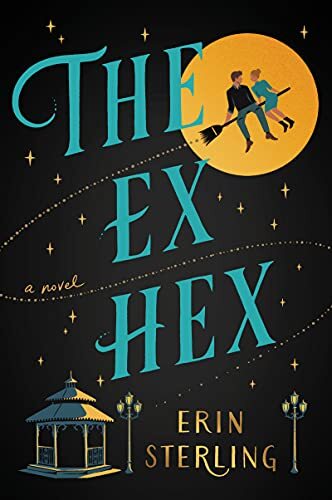
Nine years ago, Vivienne Jones nursed her broken heart like any young witch would: vodka, weepy music, bubble baths…and a curse on the horrible boyfriend. Sure, Vivi knows she shouldn’t use her magic this way, but with only an “orchard hayride” scented candle on hand, she isn’t worried it will cause him anything more than a bad hair day or two.
That is until Rhys Penhallow, descendent of the town’s ancestors, breaker of hearts, and annoyingly just as gorgeous as he always was, returns to Graves Glen, Georgia. What should be a quick trip to recharge the town’s ley lines and make an appearance at the annual fall festival turns disastrously wrong. With one calamity after another striking Rhys, Vivi realizes her silly little Ex Hex may not have been so harmless after all.
Suddenly, Graves Glen is under attack from murderous wind-up toys, a pissed off ghost, and a talking cat with some interesting things to say. Vivi and Rhys have to ignore their off the charts chemistry to work together to save the town and find a way to break the break-up curse before it’s too late.
Published: September 28, 2021
My ThoughtsPlease don’t stick pins in a voodoo doll that looks like me. I liked The Ex Hex, but I thought the story lacked substance.
The romance is mostly lust-fueled, so be prepared for sexually explicit scenes. Aside from their strong sexual attraction, I didn’t get much sense of what drew or held this couple together. The vibe is more sex-com than rom-com.
The plot is a bit lackluster. Through most of the book, the pursuit of sex is more prominent than solving the mystery of the hex. Things finally start happening in the final quarter of the book, which is when the magic gets interesting. Unfortunately, this part also feels rushed.
I did love the humor. I also liked the main characters, and I think this first book sets up lots of potential for the series.
The post Book Review — THE EX HEX by Erin Sterling appeared first on Quiet Fury Books.
Book Review — SAND TO GLASS: Tales from the Mythusian Empire by Remy Apepp
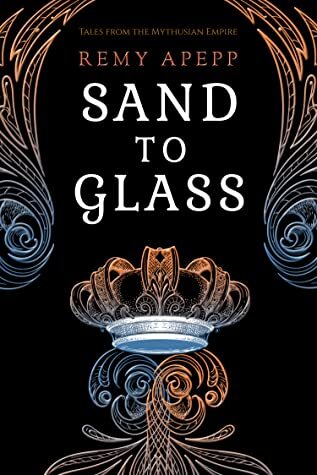
Somewhere at the edge of the Great Being’s dream lies a desert kingdom ruled by four young siblings. One burns with rage like fire. One battles monsters to make his siblings smile. One laughs with ruthless charm. One itches with desperation. All teeter on the edge of madness.
In Remy Apepp’s harrowingly beautiful Sand to Glass, the Kingdom of Ordyuk finds itself faced with destruction. Endlessly attacked by accursed beings, the kingdom relies ever more heavily on the four siblings. Under such a weight, their only choice is to grow into monsters themselves—
Or to shatter like glass.
Release Date: November 1, 2021
My ThoughtsSand to Glass is a deep-dive character study of four siblings, in a setting that’s part mythology and part fantasy, with writing that gives us a literary, introspective vibe.
This story is about familial relationships and expectations, and the way they shape and define us. It’s about monsters, within and around us. I think this story is like myths and fairy tales in the sense that each of us will find our own connection, something that reflects back to us an image and understanding of our own lives.
Nothing about this book resembles anything I’ve read before, and I absolutely did not see that ending coming.
*I received an eARC from Thinklings Books.*
The post Book Review — SAND TO GLASS: Tales from the Mythusian Empire by Remy Apepp appeared first on Quiet Fury Books.
October 15, 2021
New Release Spotlight — TO BRING HIM HOME AND OTHER TALES by Warren Rochelle

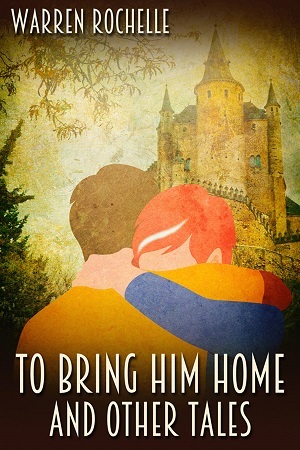
We all need a place to call home, a place where we belong, and are safe, and loved. For the lovers in these stories, finding home is easier said than done. Quests must be taken; dragons must be slain. Rocket launchers need to be dodged. Sometimes one might have to outrun the Wild Hunt, and sometimes they have to reimagine and recreate home. But these lovers do find homes, homes in each other’s hearts.
TO BRING HIM HOME
Author: Warren Rochelle
Publishing Company: JMS Books
Release Date: Saturday, September 11 2021
Cover Artist: JMS Books
Genre: Science Fiction/Fantasy
BUY LINKS:
Amazon
Kobo
Barnes and Noble
Publisher
He found his mother in her bathroom, lying on the bathmat by the tub, like a discarded hotel towel, white and crumpled. Fletcher knelt down and touched her bruised face, tenderly traced the hand prints on her skin. Cold. He then pressed his fingers against the veins in her neck. No pulse. Wishing he could cry for her, he put the same fingers under her nose. No breath, Dead. Emptied. He picked up her arm and it flopped as if boneless, She was wearing her bathrobe. He pulled it close, to hide her body.
Fletcher knew where to look, upstairs, behind the locked attic door. Through the door he could hear what he had come to call Paul’s favorite music, soft, far away, with harps and wind chimes, and what sounded like the wind, and the rain, storms. and voices singing in a strange language he had never been able to identify. The music sort of reminded him of the wind chimes on Sam’s porch. Of course.
He tried the knob. This time the door was unlocked.
“Fletcher. You’re awake. I knew you’d come up here,” his stepfather said in his cold and dark voice. He sat at a desk facing a door frame standing in the middle of the attic. Inside the door frame: darkness. Around it, Fletcher could see the rest of the attic: the shelves, the file cabinets, the odd boxes. The skylight was open, mid-day sun streamed in. Even so, the room was cold, a cold that was coming through the door, as if blown by some faraway wind. Paul’s black staff leaned against the door frame. He closed a little carved box on his desk and the music stopped.
“What did you do with Sam? Where is he? Where are his parents?” Fletcher asked, shivering and hugging himself against the cold.
“Where they belong,” Paul said, leaning back in his chair. “The dreams have escaped for millennia—even before Her Majesty came to power—into human minds. Fairy tales, myths, story upon story. A few times, the different peoples and creatures slipped through—what was it your hero said?—‘there were many chinks or chasms between worlds in old times’?—yes, I’ve read all those stories, too; they were useful to me. That was before Her Majesty. So, there are people like you and your mother, fey-touched, gifted with Sight that lets you see through glamour. Very useful to people like me.”
Fletcher swallowed the scream in his throat, knowing he had to listen, to understand, not to let this man get to him, break him into tears. “Where is Sam? What kind of a person are you?”
“I told you: There. You can call it Narnia if you like, or what did Tolkien call it? Never mind. The Celts came up with many other names, such as Tir n’Og, the Blessed Isles. Words and sounds can be dreamt, too; echoes can linger. She can’t stop the dreams of what once was, of once upon a time—slow them down, but not stop them. But Her Majesty can and must stop those who escape her winter,” Paul said, as he sorted what looked like rolls of parchment, stuffing some back into tubes, into different parts of his desk. “I am a bounty hunter, a tracker, and you, my dear Fletcher, and your mother, are my canaries.”
My dreams. I dreamed of the neighbor, I dreamed of Sam. Now I know where his music comes from.
“They hadn’t planned on Sam falling in love and having sex quite just yet, which shattered the weak child’s glamour—and I smelled him on you, his magic,” Paul said, his words dripping disdain and scorn.
“Mama’s dead.”
Paul shrugged and Fletcher hated him for it. “I needed her energy to open the gate—I was running a little low. A few days from now, no problem. You want him back?”
Fletcher slowly and carefully nodded his head.
“You think you’re in love. Fletcher! What do you know about love—who have you ever loved or who’s loved you? And when he asked for you, at the moment of peril, you pulled back. Don’t be a fool: you’re not in love.”
“My father loved me; I loved him. My mother—before you used her for food. Sam loves me.”
“Then go get him. Into Faerie. No happy elves, no dancing fauns, no chatty mice, no heroes with magic swords. No performing Lion, just Her Majesty’s winter. No English
children. Your boyfriend’s there, Fletcher. Or you could stay here and help me—starting with finding that sanctuary. Do you know how old I am? Her Majesty rewards her faithful: I am two hundred and thirteen of your years old. I have anything I want.”
I want Sam . “Live that long, be like you? No. I love Sam.”
“You’ve known him a week and you’re in love. That really is a fairy tale. You just think you do,” Paul said, dismissing Fletcher’s feelings with a flip of his hand. “You can have any boy you want, any way you want—like I said, Her Majesty rewards her faithful. Besides, you’re a coward,” Paul added, laughing.
Fletcher knew that Paul would never understand, could never understand, that even the uncertainty was enough, that the brightness in his heart, the geodes in his pocket, were enough, even if the week had been just the promise of what would come. Could have come. Might come. Maybe he was a coward. He certainly was afraid, and very good at being afraid. But life had found him, and being afraid didn’t mean he couldn’t go through that dark gate.
“Find yourself another canary,” Fletcher said and before Paul could stop him, ran across the room, through the door frame, into the dark, into the fairy tale.
 About the Author
About the Author Warren Rochelle lives in Charlottesville, Virginia, and has just retired from teaching English at the University of Mary Washington. His short fiction and poetry have been published in such journals and anthologies as Icarus, North Carolina Literary Review, Forbidden Lines, Aboriginal Science Fiction, Collective Fallout, Queer Fish 2, Empty Oaks, Quantum Fairy Tales, Migration, The Silver Gryphon, Jaelle Her Book, Colonnades, and Graffiti, as well as the Asheville Poetry Review, GW Magazine, Crucible, The Charlotte Poetry Review, Romance and Beyond, Migration, and Innovation.Rochelle is the author of four novels: The Wild Boy (2001), Harvest of Changelings (2007), and The Called (2010), all published by Golden Gryphon Press, and The Werewolf and His Boy, published by Samhain Publishing in September 2016. The Werewolf and His Boy was re-released from JMS Books in August 2020. His first short story collection, The Wicked Stepbrother and Other Stories, was published by JMS Books in September 2020.Both The Werewolf and His Boy and The Wicked Stepbrother and Other Stories, received strong reviews from blog tours in November 2020.
Warren Rochelle lives in Charlottesville, Virginia, and has just retired from teaching English at the University of Mary Washington. His short fiction and poetry have been published in such journals and anthologies as Icarus, North Carolina Literary Review, Forbidden Lines, Aboriginal Science Fiction, Collective Fallout, Queer Fish 2, Empty Oaks, Quantum Fairy Tales, Migration, The Silver Gryphon, Jaelle Her Book, Colonnades, and Graffiti, as well as the Asheville Poetry Review, GW Magazine, Crucible, The Charlotte Poetry Review, Romance and Beyond, Migration, and Innovation.Rochelle is the author of four novels: The Wild Boy (2001), Harvest of Changelings (2007), and The Called (2010), all published by Golden Gryphon Press, and The Werewolf and His Boy, published by Samhain Publishing in September 2016. The Werewolf and His Boy was re-released from JMS Books in August 2020. His first short story collection, The Wicked Stepbrother and Other Stories, was published by JMS Books in September 2020.Both The Werewolf and His Boy and The Wicked Stepbrother and Other Stories, received strong reviews from blog tours in November 2020.
SOCIAL LINKS:
Facebook (Personal): https://www.facebook.com/warren.rochelle
Facebook (Author Page): https://www.facebook.com/warrenwriter
Twitter: https://twitter.com/WarrenRochelle
Goodreads: https://www.goodreads.com/author/show/38355.Warren_Rochelle

The post New Release Spotlight — TO BRING HIM HOME AND OTHER TALES by Warren Rochelle appeared first on Quiet Fury Books.
October 14, 2021
Book Review — IT WILL JUST BE US by Jo Kaplan
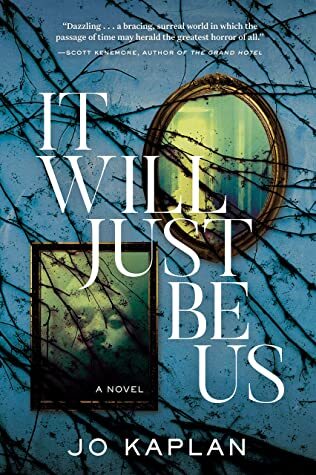
They say there’s a door in Wakefield that never opens…
Sam Wakefield’s ancestral home, a decaying mansion built on the edge of a swamp, isn’t a place for children. Its labyrinthine halls, built by her mad ancestors, are filled with echoes of the past: ghosts and memories knotted together as one. In the presence of phantoms, it’s all Sam can do to disentangle past from present in her daily life.
But when her pregnant sister Elizabeth moves in after a fight with her husband, something in the house shifts. Already navigating her tumultuous relationship with Elizabeth, Sam is even more unsettled by the appearance of a new ghost: a faceless boy who commits disturbing acts–threatening animals, terrorizing other children, and following Sam into the depths of the house wielding a knife. When it becomes clear the boy is connected to a locked, forgotten room, one which is never entered, Sam realizes this ghost is not like the others. This boy brings doom…
As Elizabeth’s due date approaches, Sam must unravel the mysteries of Wakefield before her sister brings new life into a house marked by death. But as the faceless boy grows stronger, Sam will learn that some doors should stay closed–and some secrets are safer locked away forever.
This is a difficult book to review because I really enjoyed some aspects, but the overall story was just okay.
The positive: Loved the eerie premise of a house that retains echoes of the past. The claustrophobic atmosphere offers some creepy, unsettling moments.
The negatives (for me): The writing is way too flowery. The term “waxing poetic” kept coming to mind as I read. I found it distracting, pointing readers’ focus at the purple prose rather than immersing us in the story.
Content is repetitive.
Character development is minimal. For instance, Sam’s mother loves the house so much that she puts it ahead of everything else in her life, yet she allows it to literally fall apart around her. She doesn’t do a bit of cleaning, ever, and neither does Sam. Mold and rot are consuming this place, but the why is never explained. What kind of people willingly live in such a decrepit, filthy house, showing zero interest in even the basic sanitary cleaning? The state of ruin is a major aspect of the story, but I never understood why. Consequently, it feels like nothing more than a convenient plot device for a spooky novel.
I listened to the majority of this on audio via Scribd. Narration is immersive and kept me engaged.
The post Book Review — IT WILL JUST BE US by Jo Kaplan appeared first on Quiet Fury Books.
New Release Spotlight — ARDENNIA: The Unlikely Story of Cinderella’s Prince by Bruce Calhoun
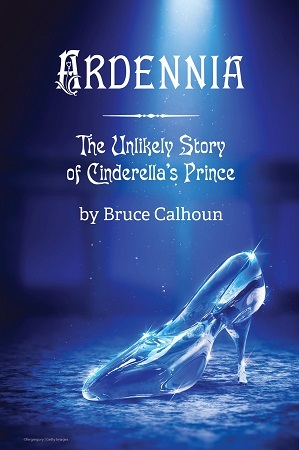 Like any prince in the middle ages, Henry is brought up to be a knight and a wise ruler. The folksy and grizzled Sir Guy instructs him in the arts of war. His indomitable mother teaches him diplomacy by example. Friar Bede serves as his history tutor, and explains that even if Henry is not a descendent of Charlemagne he should pretend to be.
Like any prince in the middle ages, Henry is brought up to be a knight and a wise ruler. The folksy and grizzled Sir Guy instructs him in the arts of war. His indomitable mother teaches him diplomacy by example. Friar Bede serves as his history tutor, and explains that even if Henry is not a descendent of Charlemagne he should pretend to be.
Upon attaining young adulthood Henry faces his first trial – participating in the Battle of Paris where he fights alongside his father and the lusty free knights with a courage he thought he did not possess. His second trial is the quest he undertakes to find the owner of a slipper that was left behind at a masquerade ball by an enigmatic woman.
With the trusty Sir Guy at his side Henry calls on the fourteen Ladies who officially attended the ball, all of whom live far away in their principalities. Some of these Ladies are tall, some short, some shy, some vain, some frog-like, some sweet; none of them can fit their feet into the enigmatic woman’s slipper.
Between calls, Henry and Guy encounter adventure and many colorful characters which include a bean counter who wagers his gold tooth in a dice game, an epileptic bard, a merchant who can never be too prosperous, a band of female brigands, pilgrims that argue over who is the most pious, a cobbler who has come into the possession of a goose that supposedly lays golden eggs, a peddler who peddles magic elixirs, a little girl who loves her prize sow more than anything in the world, a boy who wants to be a knight and is fascinated to hear Sir Guy’s dragon stories, a minstrel who claims he charmed a giant with his flute, another little girl who has a running feud with three bears, a hermit who has been mistaken as a hobgoblin and a beggar who has been cursed with leprosy for committing all the cardinal sins.
After all these encounters and his failure to find the enigmatic woman, Henry returns to his realm to find Cinderella serendipitously; thus bringing the tale to a happy ending.
BOOK LINKS:
Amazon
Draft2Digital
Goodreads
Chapter 10
Two Ladies of Very Different Temperaments
Two days later Henry had another tete-a tete, this time with the daughter of the Viscount of Montreuil. The second he saw her he knew she was not who he was looking for because she was too tall. Disappointed, he made some polite conversation and then said he had to be going on his way. Tears welled up in her eyes.
“What’s the matter?” he asked.
“Why must you leave so soon? Did I say something to offend you?” she said.
“No,” he said.
“I did, didn’t I. I’m sorry; I just say the stupidest things sometimes. I don’t know why. Maybe it’s because I get so nervous when I’m around men and I try too hard to compensate for being so tall.”
“You didn’t say anything stupid and you’re not too tall,” he said diplomatically.
“I’m taller than you and being taller than a prince is never a good thing.”
“I don’t know about that. I think tall women are very alluring,” said Henry.
“You do,” she said, brightening up.
“Yes,” he said.
“Even if they tower over you like I do?”
“The taller the better,” he said.
“Well I don’t think you will ever find anyone taller than me, so why are you in such a hurry to leave?”
“Because you are wrong about that; there is a woman taller than you and I am on a quest to find her.”
“Really?” she asked.
“Really,” he answered.
“That’s so romantic. How tall is she?”
“She’s taller than you by a head,” Henry said.
“Then you must be on your way to find her.”
“Thank you for understanding,” he said, rising to his feet.
She rose to her feet too, looked down on him, bid him farewell and told him she would never forget him and that she hoped he would succeed in his quest to find the very tall lady and live happily ever after. He thanked her, made his way out of the Viscount’s residence and rejoined Guy, who was standing outside holding the palfreys and mule, and feeding his goat a carrot.
“Let’s go while the going is good,” said Henry.
“She wasn’t the one I assume,” Guy said.
“No, and I want to get out of here before I have to tell anymore lies,” said Henry.
“Sometimes telling lies is the only thing you can do,” said Guy.
“Is that so,” said Henry, saddling up.
“That’s so, especially when you are sparing peoples’ feelings,” said Guy, saddling up too.
“How do you know I was lying to do that?” asked Henry.
“Because I know you,” said Guy.
On that note they put the residence of the Viscount of Montreuil behind them and headed for the ferry which would take them across the River Oise and to the next lady on Henry’s list; the pack mule in tow and the goat – now off its tether – following in their wake.
They reached the crossing just as the ferry departed for the other side and they had to cool their heels. As they were cooling their heels a merchant with a pasty face and a floppy hat arrived with a cart full of his wares. He pulled the reins on his nag as he came up to them and asked if they were interested in buying a bolt of wool cloth.
“Do we look like we need a bolt of wool cloth?” asked Guy.
“No, but It never hurts to ask. Where are you bound?” asked the merchant.
“Where are you?” countered Guy.
“To greener pastures. No one on this side of the river is interested in my wool, which is a shame because it is very finely woven and I’m selling it at a discount.”
“Perhaps no one is interested in your wool because your competitors have beaten you to the punch,” said Guy.
“Ah, my competitors; they are the bane of my existence. If it weren’t for them I would be swimming in coin. As it is I don’t even have the two deniers for my ferry passage.”
“Then how are you going to get across?” asked Guy.
“I don’t know. Maybe the ferryman will accept a promise that I will pay him later.”
“Would you accept such a promise for your wares?” Guy asked.
“Certainly not; that would be bad business.”
“Then why would you expect the ferryman to?” asked Guy.
“Because he is only selling his services and I am selling goods,” explained the merchant.
“But it’s the same principle,” said Henry, jumping in.
“That may be, but giving my goods away on a promise could cost me dear while giving me a ride across the river – even if I never honored my promise – would cost the ferryman nothing.”
“Nothing but his labor and the setting of precedent that he is an easy mark,” Prince Henry said.
The man at the center of their debate arrived with his ferry and discharged a tinker and his wagon onto the shore.
“How is business on the other side?” asked the merchant of the tinker.
“As good as can be expected; there is always someone who needs a pot mended,” said the tinker.”
“And have you encountered any merchants selling their goods?” the merchant asked.
“Only in the market town of Sossions; they hold their market days every Tuesday,” said the tinker.
“Were any merchants selling bolts of wool cloth there?”
“I don’t know, I was too busy tinkering to notice,” said the tinker.
“Thank you. By the way, would you be interested in a bolt of wool cloth. I have some very nice cloth that is as blue as your eyes,” said the merchant.
“I’ve no need for a bolt of cloth, blue or otherwise. Fare thee well,” said the tinker, going on his way.
“Come on!” said the ferryman to the merchant, having waited long enough for him.
The merchant boarded the ferry, joining Henry and Guy.
“That will be two deniers,” said the ferryman.
The merchant made a show of checking his pockets and coming up empty.
“Two deniers,” repeated the ferryman.
“I seem to be bereft of coin at the moment. But if you will give me credit I will settle with you upon my return from Sossions.
“Two deniers or you can get off my ferry,” said the ferryman.
“Be reasonable. Is it not better to give me passage and accept payment later than to leave me stranded on this side of the river and have no prospect of making a profit off me?”
“For the last time, that will be two deniers,” the ferryman said.
“Here, I will pay his passage,” said Henry, giving the ferryman two deniers.
The ferryman took the two deniers and started pulling on rope which was tied around a big cottonwood tree on the other side of the river. Slowly the ferry began to move toward the opposite shore.
“I am in your debt and at the first opportunity I will recompense you with interest,” said the merchant.
“There is no need to recompense me. Hopefully your business will prosper and someday you will be in a position to help someone who is in a pinch,” said Henry.
“If I prosper I will certainly do so, provided I prosper enough.”
“How much is enough?” asked Guy.
“Well, in truth one can never prosper enough. That is the creed I go by.”
“Isn’t having a fine home, food on the table and clothes on your back prosperity enough?” asked Guy.
“Not nearly,” answered the merchant.
“Well what if you added a good amount of land under tillage and a sack of gold coins stashed away in a safe place,” said Guy.
“Still not enough,” the merchant said.
“Would owning a fleet of merchant ships do it then?” asked Guy.
“No.”
“How about coming into possession of a gold mine with inexhaustible reserves?”
“That is getting close,” said the merchant.
“Close?”
“Yes; you see prosperity can be a fragile thing and you can never have too much of it. Suppose my house burned down. Suppose a drought came and ruined my crops under tillage. Suppose I forgot where I stashed my coins and my fleet was lost in a storm and there was a catastrophic cave in at my mine: what would I do then?”
“Start all over, I guess,” said Guy.
“Exactly; and who wants to start all over after being prosperous but not prosperous enough,” said the merchant as the ferryman toiled to earn his deniers.
“I see your point. But what if everyone lived by your creed?”
“Then everyone would be prosperous or on the verge of prosperity.”
“I don’t think that would be possible,” said Guy.
“Why not?” asked the merchant.
“Because there is not enough to go around for everyone to prosper to the extent you are saying,” said Guy.
“Perhaps, at any rate there is enough to make some people immensely prosperous, and I intend to be one of them,” concluded the merchant who hadn’t had the two deniers for his passage on the ferry.
Guest PostThe History of Romance Novels and Fairy Tales

Romance novels have a long lineage. They date back to the medieval age and were labeled romance novels not because they were about romance, but because they were written in the French vernacular and not Latin. Thus, they were called romances because French is a romantic language. The romances were wildly popular with the French nobility, and because no one else but the clergy could read or had access to rare and expensive books, the stories were always about kings, queens, knights, ladies and clerics. The Arthurian tales based on legends written in Latin are a prime example. Chrétien de Troyes’ was the first writer who used the French language to elaborate on these tales.
The formula for these romances was pretty basic: Everything is copasetic, some kind of problem or need comes up, the hero goes on a quest, the quest is successful, the hero finds love with his lady and the tale ends happily. The earliest romances were based not only on local legends, but on the great epics like Virgil’s Aeneid . However, as they evolved the heroes of these tales had to exhibit gallantry to the ladies as well as martial prowess. It was no longer sufficient to slay foes on the battlefield; a warrior had to win hearts in the boudoir.
From the courts of France romances conquered the rest of Europe with the help of such patrons as Marie de Champagne and Eleanor of Aquitaine. The names of most the authors of these works have been long forgotten. One name, in particular, has not: Geoffrey Chaucer. His Canterbury Tales contain several romances, though he is best known for establishing the sub-genre of the satire.
During the late medieval age the invention of the printing press and the emergence of the middle class resulted in the inclusion of common folk in romances. Books like Sir Amadace portrayed a merchant as a hero, and women also came into their own. In Amoryus and Cleopes a lady defeats a dragon with her wiles much to the delight of its readers – who were mostly women. Taking it one step further, authors began to write about peasants. They often featured peasant children in “fairy tales” like Jack and the Beanstalk or Goldilocks and the Three Bears.
In the sixteenth century the intellectuals of the humanist period began disparaging romances. One such intellectual, Michel de Montaigne, called romance novels “wit-besotting trash”. Another, Juan Luis Vives, warned that romances engendered “beastly and filthy desire”. The church got into the act by prohibiting some romances. This only made romances more popular, and they remained in fashion up to the early modern era. Sadly, most of these books are lost to posterity. But they were the antecedents of fairy tales, the novel and today’s fantasy fiction. We owe much to the old romances, and many of their plots and characters live on in the works of such writers as Shakespeare, Goethe, Sir Walter Scott and Jonathan Swift.
My tribute to the old romances and the fairy tales that sprang from them is a unique retelling of the Cinderella tale; described below.
Ardennia: The Unlikely Story of Cinderella’s Prince is a Cinderella story like no other that captures the magic, brutality and earthiness of the medieval ages. This first book in a series chronicles the many adventures of Cinderella’s Prince as he undergoes his baptism of fire in the Battle of Paris, is charmed by Cinderella at a masquerade ball, and sets off on a quest to find her after she flees the ball at the midnight hour. The quest takes him through strange lands supposedly inhabited by ogres, pixies, hobgoblins, man-eating plants and giants, and peopled by extraordinary characters that include an epileptic bard, a bean counter who wagers his gold tooth in a dice game, a merchant who can never be too prosperous, a little girl who has a running feud with three bears, pilgrims that argue over who is the most pious and a beggar who has been cursed with leprosy for committing all the cardinal sins. Be on the look-out for a bit of Chaucer-like satire.
 I am a literature-major drop out who received a Bachelor’s degree in biology and science education from the University of Wisconsin. I taught marine biology in Puerto Rico, worked as a diver for the Australian Institute of Marine Science, wrote an award winning play and founded Save the Rainforest in 1988 www.savetherainforestnow.com. In my spare time I read, bicycle, cross country ski and write plays and novels.
I am a literature-major drop out who received a Bachelor’s degree in biology and science education from the University of Wisconsin. I taught marine biology in Puerto Rico, worked as a diver for the Australian Institute of Marine Science, wrote an award winning play and founded Save the Rainforest in 1988 www.savetherainforestnow.com. In my spare time I read, bicycle, cross country ski and write plays and novels.
To get the book, follow me or read reviews go of Ardennia go to:www.literaryworksbrucecalhoun.com/novels.html
The post New Release Spotlight — ARDENNIA: The Unlikely Story of Cinderella’s Prince by Bruce Calhoun appeared first on Quiet Fury Books.




